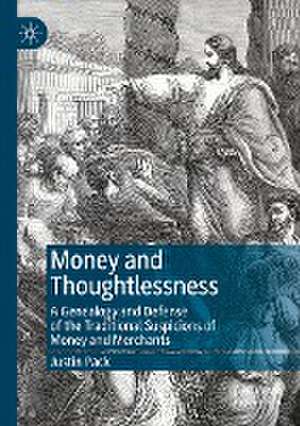Money and Thoughtlessness: A Genealogy and Defense of the Traditional Suspicions of Money and Merchants
Autor Justin Packen Limba Engleză Paperback – 3 ian 2024
| Toate formatele și edițiile | Preț | Express |
|---|---|---|
| Paperback (1) | 722.58 lei 6-8 săpt. | |
| Springer International Publishing – 3 ian 2024 | 722.58 lei 6-8 săpt. | |
| Hardback (1) | 727.80 lei 6-8 săpt. | |
| Springer International Publishing – 2 ian 2023 | 727.80 lei 6-8 săpt. |
Preț: 722.58 lei
Preț vechi: 881.19 lei
-18% Nou
Puncte Express: 1084
Preț estimativ în valută:
138.31€ • 150.29$ • 116.25£
138.31€ • 150.29$ • 116.25£
Carte tipărită la comandă
Livrare economică 21 aprilie-05 mai
Preluare comenzi: 021 569.72.76
Specificații
ISBN-13: 9783031222634
ISBN-10: 3031222636
Pagini: 238
Ilustrații: VII, 238 p.
Dimensiuni: 148 x 210 mm
Greutate: 0.3 kg
Ediția:1st ed. 2023
Editura: Springer International Publishing
Colecția Palgrave Macmillan
Locul publicării:Cham, Switzerland
ISBN-10: 3031222636
Pagini: 238
Ilustrații: VII, 238 p.
Dimensiuni: 148 x 210 mm
Greutate: 0.3 kg
Ediția:1st ed. 2023
Editura: Springer International Publishing
Colecția Palgrave Macmillan
Locul publicării:Cham, Switzerland
Cuprins
1 Introduction.- 2 Money, Myths, and Thoughtlessness.- 3 The Neolithic Revolution: From Social Currencies to Debt.- 4 The Axial Age.- 5 Animist Ontologies, Abstraction, and Slavery.- 6 Mastering Money: Usury, Governance and Science in Medieval Europe.- 7 The Modern Attacks on the Traditional Suspicions of Money and Merchants.- 8 Against Homo Economicus: Mauss and Gift Cultures.- 9 The Hermeneutics of Suspicion and Contemporary Cynicism.- 10 Money and Thoughtlessness: Abstraction, Quantification, Adiaphorization.- 11 Conclusions.
Notă biografică
Justin Pack is a Lecturer in Philosophy at California State University, Stanislaus, USA.
Textul de pe ultima copertă
In this book, Justin Pack proposes a genealogy of the traditional suspicion of money and merchants. This genealogy is framed both by how money itself has changed and how different traditions responded to money. Money and merchants became heavily debated concerns in the Axial Age, which coincided with the spread of coinage. A deep suspicion of money and merchants was particularly notable in the Greek, Confucian and Christian traditions, and continued into the Middle Ages. These traditions wrestled with a new dialectic of purity that also appears with the widespread use of money. How were these concerns dealt with politically, socially and philosophically? How did they change over time? How did medieval Europe deal with money and how did this inform modern governmentality? To answer these questions, Pack turns to Hanna Arendt’s work. Arendt argues that one of the outstanding characteristics of our time is thoughtlessness. This thoughtlessness is related to how modern life, especially under neoliberalism, is increasingly structured by abstract systems, abstract calculative rationality, abstract relations, and the profit motive. Money both drives and embodies this machinery. The hyper-complex abstract systems of modernity discourage, to use Arendtian terms, “thinking” (wonder, questioning everything) in favor of “cognition” (problem solving). Too often the result is thoughtless cognition—the ability to make things more productive and efficient paired with the incapacity to question and challenge the implications and morality of these systems
Justin Pack is a Lecturer in Philosophy at California State University, Stanislaus, USA.
Justin Pack is a Lecturer in Philosophy at California State University, Stanislaus, USA.
Caracteristici
Applies the thought of Hannah Arendt to the question of money in society Provides a genealogy of the suspicions of money and merchants Engages in current debates about money
